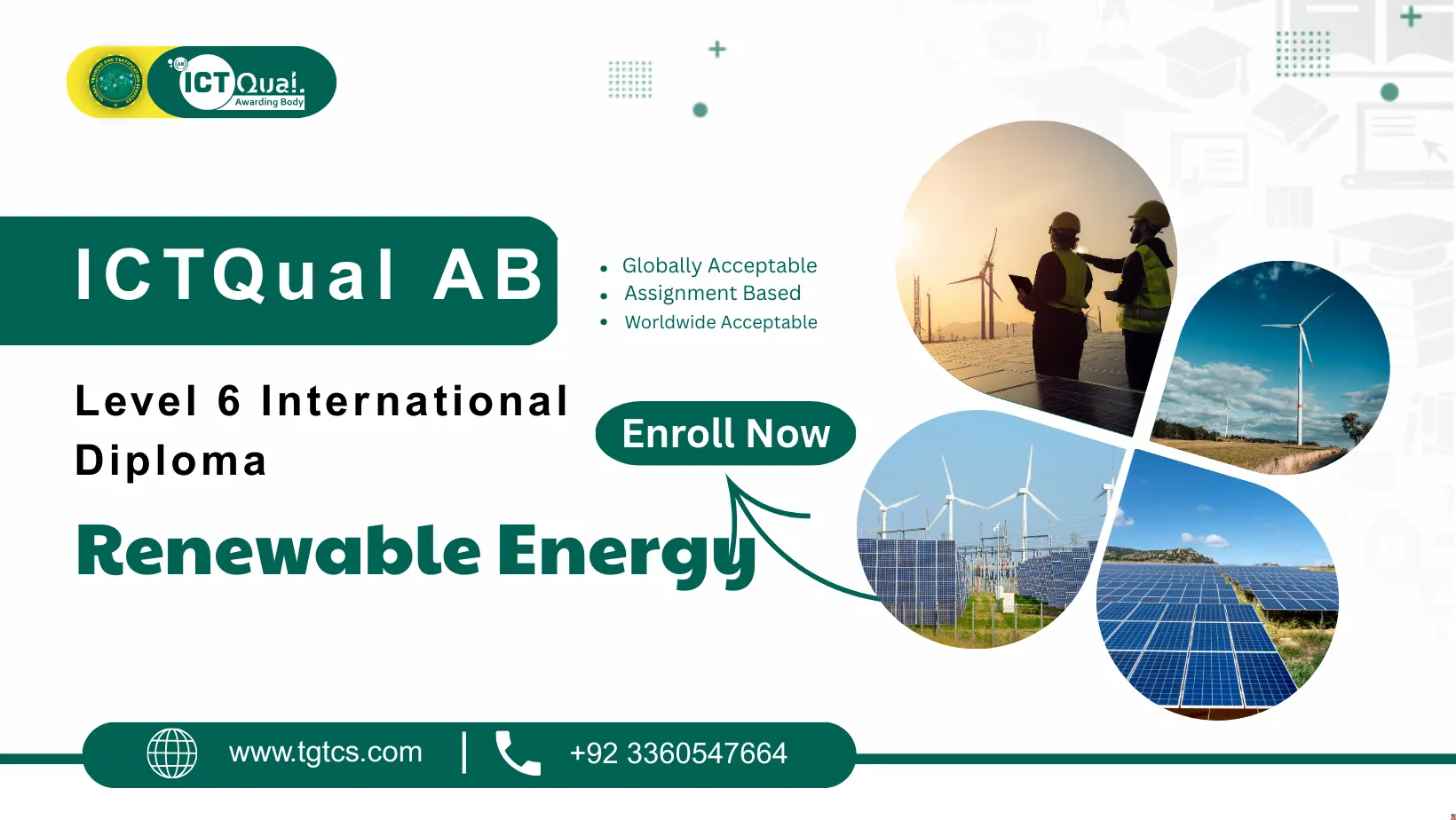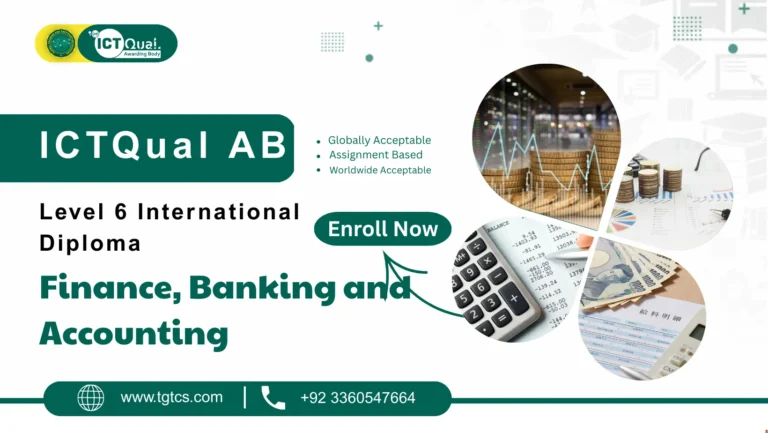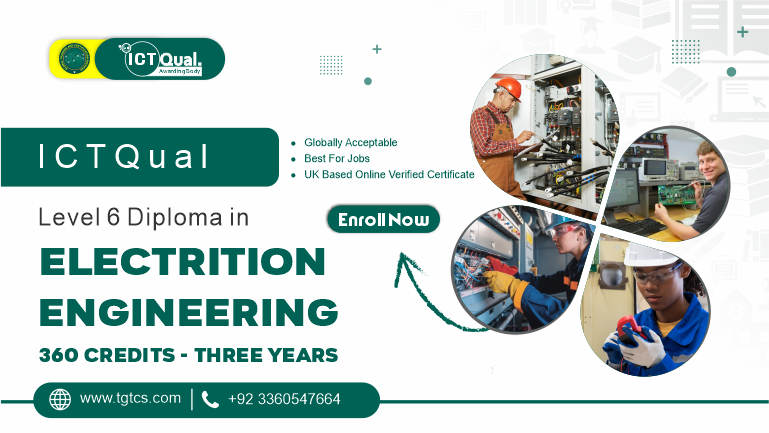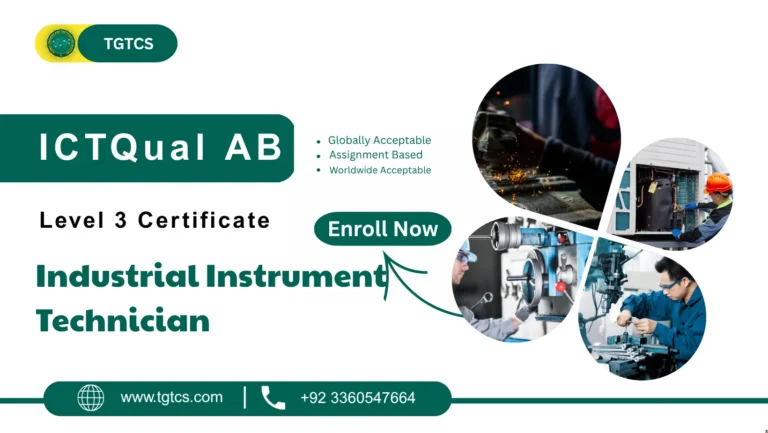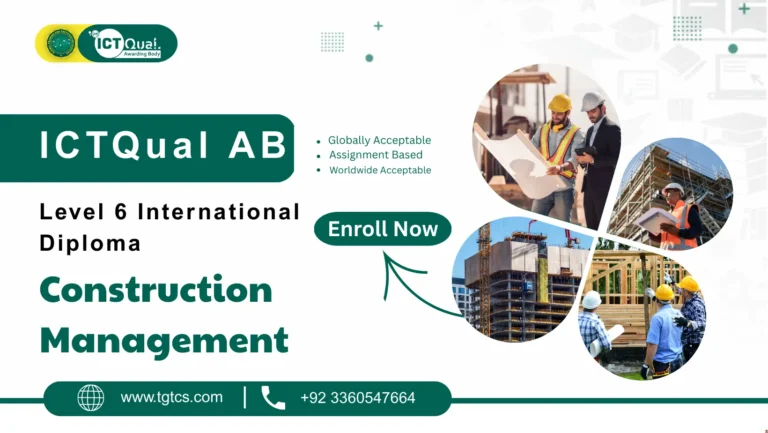ICTQual AB Level 6 International Diploma in Renewable Energy
The ICTQual AB Level 6 International Diploma in Renewable Energy is a globally recognized qualification designed to prepare learners for leadership and technical roles in the fast-growing clean energy sector. As the world accelerates its shift toward a low-carbon future, renewable energy professionals are in high demand to drive the global energy transition and support sustainable development goals.
ICTQual AB Level 6 International Diploma provides learners with advanced knowledge, practical expertise, and strategic insight into renewable energy systems, including solar, wind, hydro, geothermal, and bioenergy technologies. ICTQual AB Level 6 International Diploma in Renewable Energy goes beyond theory by integrating real-world applications, project-based learning, and case studies that reflect the latest innovations in the renewable energy industry.
Learners will gain a strong foundation in renewable energy management, project planning, energy efficiency, and sustainability practices, while also developing critical skills in policy analysis, environmental compliance, and the economics of renewable energy. Through practical training, advanced simulations, and industry-focused modules, graduates will be fully prepared to design, implement, and optimize projects at both local and international levels.
The ICTQual AB Level 6 International Diploma in Renewable Energy empowers professionals to pursue rewarding clean energy careers across diverse industries, including energy utilities, consultancy, research, government, and international organizations. By completing ICTQual AB Level 6 International Diploma in Renewable Energy, learners will not only strengthen their technical and managerial expertise but also contribute meaningfully to building a sustainable and resilient global energy future.
The Global Training and Certification Services is Approved Training Centre of ICTQual AB UK Ltd
Course Level and Credits
ICTQual AB Level 6 International Diploma in Renewable Energy, 360 credits.
Suitable for engineers, energy professionals, fresh graduates, and individuals seeking advanced expertise in renewable and sustainable energy technologies.
Mode of Study
Fully assignment-based; learn at your own pace.
Accessible worldwide with flexible learning options for students and working professionals.
Global Recognition & Attestation
British Council verifiable, MOFA and Embassy attested.
Recognized internationally for employment, career progression, and iqama approval in Gulf countries.
Scope and Purpose
Comprehensive coverage of renewable energy systems including solar, wind, hydro, geothermal, and bioenergy.
Focus on practical applications, sustainability practices, and energy transition strategies for real-world projects.
Skills and Knowledge Gained
Expertise in renewable energy management, clean energy technologies, and sustainable development.
Practical skills in project planning, energy efficiency, environmental compliance, and policy frameworks.
Ability to analyze, design, and optimize renewable energy systems at local and global levels.
Leadership and strategic decision-making skills for energy sector management.
Career Benefits
Opens opportunities in renewable energy companies, government agencies, international organizations, and sustainability consultancies.
Enhances employability for roles such as renewable energy engineer, project manager, sustainability consultant, and energy analyst.
Target Audience
Fresh graduates seeking to build careers in renewable energy and sustainability.
Experienced professionals, engineers, and managers aiming to specialize or advance in clean energy industries.
Unique Selling Points (USPs)
Flexible, self-paced study that fits into professional and personal schedules.
Prestigious and internationally recognized Level 6 diploma in renewable energy.
Ideal for global job opportunities, professional credibility, and iqama approval.
Mandatory Unit
This qualification, the ICTQual AB Level 6 International Diploma in Renewable Energy, consists of 36 mandatory units.
Year 1 – Foundation in Renewable Energy
- Principles of Renewable Energy Systems
- Introduction to Sustainable Energy Technologies
- Solar Energy Fundamentals
- Wind Energy Basics and Applications
- Hydroelectric Power Principles
- Biomass and Bioenergy Fundamentals
- Energy Conversion and Storage Basics
- Electrical and Mechanical Principles for Decarbonised Energy
- Health, Safety, and Environmental Awareness
- Laboratory Techniques in Renewable Energy
- Technical Report Writing
- Introduction to Renewable Energy Simulation Software
Year 2 – Intermediate Renewable Energy
- Advanced Solar Photovoltaic Systems
- Wind Turbine Design and Operations
- Hydropower Plant Design and Management
- Biomass Conversion and Biofuel Production
- Energy Storage Systems and Technologies
- Smart Grids and Energy Distribution
- Process Control and Automation in Renewable Energy
- Energy Efficiency and Management Strategies
- Environmental Impact Assessment and Sustainability
- Quality Control and Assurance in Energy Systems
- Project Planning and Technical Communication
- Data Analysis for Renewable Energy Projects
Year 3 – Advanced Renewable Energy
- Advanced Energy Systems Optimisation and Troubleshooting
- Energy Project Management
- Emerging Technologies in Solar and Wind Energy
- Advanced Energy Storage and Battery Technologies
- Smart Grid Integration and Management
- Sustainability and Cleaner Energy Practices
- Risk Assessment and Hazard Analysis in Energy Projects
- Advanced Laboratory Techniques and Field Testing
- Supply Chain and Logistics in Renewable Energy
- Capstone Project in Future Energy Technologies
- Professional Development and Leadership in Energy
- Strategic Decision-Making in Renewable Energy Operations
The ICTQual AB Level 6 International Diploma in Renewable Energy is designed to provide learners with advanced knowledge, technical skills, and industry-focused expertise in sustainable and clean energy systems.
Year 1 – Foundation in Renewable Energy
Principles of Systems
- Understand the core principles sustainable power generation.
- Analyze different types of renewable energy systems and their global applications.
- Evaluate energy efficiency and environmental benefits of renewable systems.
Introduction to Sustainable Energy Technologies
- Explore the scope and applications of sustainable energy technologies.
- Compare renewable energy with traditional fossil-fuel-based power generation.
- Assess the role of clean energy in reducing carbon emissions.
- Gain insights into future trends and innovations in sustainable energy.
Solar Energy Fundamentals
- Understand the principles of solar radiation and photovoltaic technology.
- Analyze solar energy conversion processes and efficiency factors.
- Evaluate the potential of solar power as a sustainable energy source.
Wind Energy Basics and Applications
- Understand the aerodynamic principles of wind power generation.
- Examine wind turbine design and operational mechanisms.
- Apply wind energy knowledge in real-world renewable projects.
Hydroelectric Power Principles
- Understand the working principles of hydroelectric power plants.
- Explore different hydropower plant designs and their applications.
- Assess the role of hydropower in sustainable energy production.
Biomass and Bioenergy Fundamentals
- Understand biomass as a renewable energy source.
- Explore bioenergy conversion processes such as combustion and gasification.
- Apply knowledge to optimize biomass energy systems.
Energy Conversion and Storage Basics
- Understand the principles of energy conversion and storage.
- Explore different energy storage technologies and their applications.
- Analyze efficiency and limitations of energy storage systems.
Electrical and Mechanical Principles for Decarbonised Energy
- Understand the role of electrical and mechanical principles in renewable energy.
- Apply engineering concepts to optimize clean energy technologies.
- Solve technical challenges in renewable energy engineering.
Health, Safety, and Environmental Awareness
- Understand health and safety regulations in renewable energy operations.
- Apply risk management and hazard prevention in energy projects.
- Assess environmental impacts of renewable energy projects.
Laboratory Techniques in Renewable Energy
- Learn laboratory procedures for renewable energy testing.
- Apply practical skills in solar, wind, and biomass experiments.
- Collect and analyze renewable energy data accurately.
- Ensure safety and reliability in laboratory practices.
Technical Report Writing
- Develop effective technical writing skills for renewable energy projects.
- Present research findings and technical data professionally.
- Enhance communication skills in technical documentation.
Introduction to Renewable Energy Simulation Software
- Explore simulation software for renewable energy system design.
- Analyze efficiency and optimize performance using simulations.
- Gain practical skills in renewable energy project planning.
Year 2 – Intermediate Renewable Energy
Advanced Solar Photovoltaic Systems
- Understand the design and functioning of advanced solar PV systems.
- Analyze system efficiency, performance monitoring, and fault diagnosis.
- Apply advanced solar integration techniques in residential and industrial projects.
Wind Turbine Design and Operations
- Understand the principles of modern wind turbine design.
- Apply mechanical and electrical engineering in wind energy operations.
- Assess safety and environmental considerations in wind turbine operations.
Hydropower Plant Design and Management
- Understand hydropower plant components and operational mechanisms.
- Analyze energy efficiency and water resource sustainability.
- Manage safety and environmental challenges in hydropower operations.
Biomass Conversion and Biofuel Production
- Explore advanced techniques for biomass conversion into energy.
- Understand biofuel production processes and technologies.
- Evaluate the sustainability and commercial viability of biofuels.
- Apply bioenergy systems for renewable energy integration.
Energy Storage Systems and Technologies
- Understand advanced storage technologies such as batteries and fuel cells.
- Apply energy storage in stabilizing renewable energy supply.
- Analyze challenges of large-scale energy storage deployment.
- Evaluate cost, efficiency, and sustainability of storage systems.
Smart Grids and Energy Distribution
- Apply smart technologies for efficient energy distribution.
- Analyze the integration of renewable energy into grid networks.
- Evaluate cybersecurity and reliability challenges in smart grids.
Process Control and Automation in Renewable Energy
- Understand automation systems in renewable energy plants.
- Apply process control technologies to improve plant performance.
- Analyze the role of sensors, SCADA, and AI in energy operations.
- Enhance efficiency and safety through automation techniques.
Energy Efficiency and Management Strategies
- Understand methods to optimize energy efficiency in renewable systems.
- Analyze energy performance indicators and benchmarking.
- Promote sustainable management practices in energy use.
Environmental Impact Assessment and Sustainability
- Understand environmental impact assessment methods for energy projects.
- Apply sustainability principles in renewable energy planning.
- Analyze ecological, social, and economic impacts of energy projects.
- Propose mitigation strategies for environmental challenges.
Quality Control and Assurance in Energy Systems
- Understand quality control standards in renewable energy projects.
- Analyze testing procedures and compliance requirements.
- Enhance long-term performance through continuous monitoring.
Project Planning and Technical Communication
- Understand project planning techniques in renewable energy.
- Apply project management tools for scheduling and resource allocation.
- Develop technical communication skills for effective reporting.
- Manage renewable energy projects from concept to completion.
Data Analysis for Renewable Energy Projects
- Understand the role of data in renewable energy performance evaluation.
- Apply statistical and analytical methods to project data.
- Use data-driven insights to optimize renewable energy systems.
Year 3 – Advanced Renewable Energy
Advanced Energy Systems Optimisation and Troubleshooting
- Understand advanced methods of optimizing renewable energy systems.
- Apply troubleshooting techniques to resolve technical issues.
- Analyze efficiency, reliability, and safety in energy operations.
Energy Project Management
- Understand project management principles in renewable energy projects.
- Apply planning, budgeting, and scheduling tools for energy initiatives.
- Analyze risk management and resource optimization strategies.
Emerging Technologies in Solar and Wind Energy
- Explore the latest advancements in solar and wind energy systems.
- Analyze the role of innovation in renewable energy growth.
- Evaluate the feasibility of adopting emerging technologies.
Advanced Energy Storage and Battery Technologies
- Understand cutting-edge energy storage and battery solutions.
- Analyze energy density, charging efficiency, and lifecycle management.
- Apply storage systems to enhance grid stability.
- Evaluate sustainability of advanced storage solutions.
Smart Grid Integration and Management
- Understand integration of renewables into modern smart grids.
- Apply advanced control systems for energy distribution.
- Analyze challenges of renewable intermittency in smart grids.
Sustainability and Cleaner Energy Practices
- Understand global sustainability goals in energy transition.
- Apply best practices for reducing carbon footprints.
- Analyze cleaner technologies for renewable energy adoption.
Risk Assessment and Hazard Analysis in Energy Projects
- Understand risk assessment frameworks for energy systems.
- Apply hazard analysis to ensure safety in energy projects.
- Analyze risks related to renewable installations and operations.
- Develop mitigation strategies for technical and environmental risks.
Advanced Laboratory Techniques and Field Testing
- Apply advanced laboratory procedures for renewable energy testing.
- Conduct field experiments to validate energy system performance.
- Ensure accuracy and safety in advanced testing processes.
Supply Chain and Logistics in Renewable Energy
- Understand global supply chain management in renewable energy.
- Analyze challenges in renewable energy equipment distribution.
- Propose solutions for efficient renewable supply chain systems.
Capstone Project in Future Energy Technologies
- Apply cumulative knowledge in a comprehensive energy project.
- Research innovative approaches to future energy challenges.
- Develop practical solutions for renewable energy advancements.
Professional Development and Leadership in Energy
- Understand leadership principles in renewable energy industries.
- Apply professional skills to advance in global energy careers.
- Develop teamwork, communication, and problem-solving capabilities.
- Build professional credibility through continuous learning.
Strategic Decision-Making in Renewable Energy Operations
- Understand strategic planning in renewable energy organizations.
- Apply decision-making frameworks for complex energy projects.
- Analyze market, policy, and technological factors influencing decisions.
- Lead organizations toward sustainable and profitable growth.
The ICTQual AB Level 6 International Diploma in Renewable Energy is a globally recognized program designed to prepare learners for leadership roles in the fast-growing clean energy sector.
Gain Advanced Knowledge
- Build in-depth understanding of solar, wind, hydro, biomass, and energy storage technologies.
- Learn to design, manage, and optimize systems.
- Understand global trends and policies driving the transition.
Develop Practical and Technical Expertise
- Master hands-on laboratory and field testing techniques.
- Use simulation software and smart grid tools for project design and analysis.
- Gain problem-solving and troubleshooting skills for real-world renewable projects.
Enhance Global Career Opportunities
- Boost employability in energy companies, government organizations, and consultancy firms.
- Prepare for careers in project management, energy engineering, sustainability, and operations.
- Secure opportunities in international markets with MOFA and Embassy attestation.
Flexible and Accessible Learning Pathway
- Study fully assignment-based modules at your own pace from anywhere in the world.
- Suitable for both fresh students and experienced professionals with prior knowledge.
- Complete assessments or fast-track through professional discussions based on experience.
Recognition and Professional Credibility
- British Council verifiable, MOFA and Embassy attested for global acceptance.
- Enhance professional reputation in sustainability fields.
- Strengthen qualifications for iqama approval and job placements in Gulf and international markets.
The ICTQual AB Level 6 International Diploma in Renewable Energy is designed for a diverse range of learners who are passionate about advancing their knowledge and careers in the clean energy sector.
Fresh Graduates and Students
- Ideal for those seeking to build a strong foundation technologies.
- Provides a clear pathway to career opportunities in global energy and sustainability sectors.
Energy and Engineering Professionals
- Suitable for engineers and technical staff working in power generation, oil & gas, or energy transition roles.
- Enhances technical expertise to shift into project design and management.
Sustainability and Environmental Specialists
- Perfect for professionals aiming to contribute to global sustainability and carbon reduction goals.
- Builds advanced skills in environmental impact assessment, energy efficiency, and cleaner technologies.
Managers and Project Leaders
- Designed for those managing or leading energy projects across industries.
- Strengthens strategic decision-making, project planning, and leadership skills in operations.
Entrepreneurs and Innovators in Energy
- Tailored for individuals looking to invest in or establish renewable energy ventures.
- Provides knowledge to evaluate market opportunities and implement sustainable energy solutions.
ICTQual AB Level 6 International Diploma in Renewable Energy is ideal for learners who want to gain advanced knowledge, practical skills, and global recognition.
Course Overview
Course Level
Level 6
Course Units
36 Units
Credits
360
Duration
3 years
